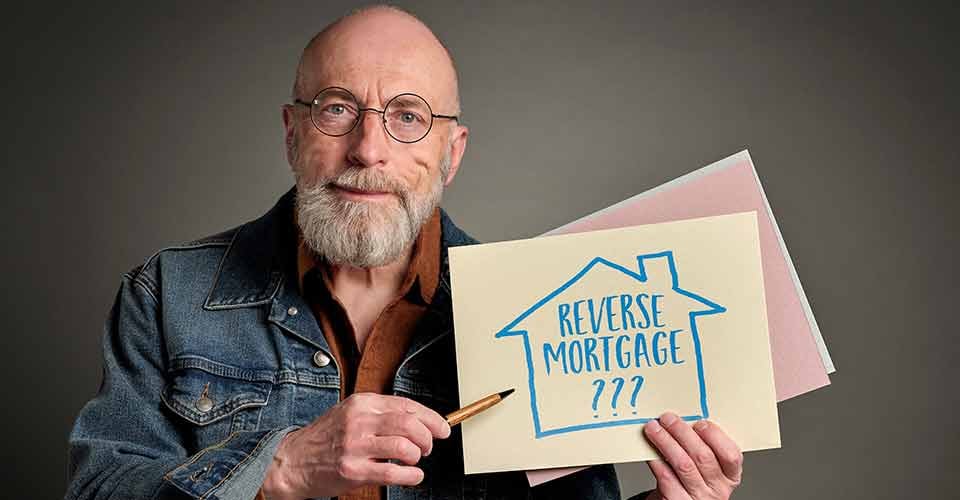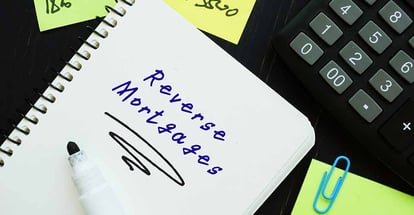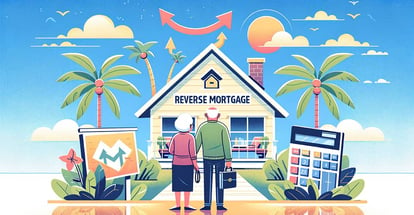Does the Bank Own the House with a Reverse Mortgage?
Reverse mortgages have become increasingly popular due to their numerous benefits, which has led some people to mistakenly assume that the lender takes full ownership of the home as part of the loan.
These benefits include:
-
If the borrower still has an existing mortgage, the lender will pay it off.
-
The lender offers the borrower a choice of six different payout plans for the loan proceeds.
- As long as the borrower complies with all loan terms, including the maintenance of the property and payment of property taxes and homeowners insurance, they can reside in their home for the remainder of their life without making monthly mortgage payments.
While there are certainly risks involved with taking out a reverse mortgage, it does not mean giving up ownership of the property itself.
In this article, we will discuss how reverse mortgages work and dispel any myths around them so you can determine if one might be right for you.
Table of Contents
- What Really Happens
- Non-Recourse Protection
- Does the bank own the house in a reverse mortgage?
- What happens to any leftover equity?
- What happens if the sales proceeds are insufficient?
- Who owns the remaining equity?
- Who pays the property taxes?
- What happens to a house when the owner dies?
- What rights do heirs have in a reverse mortgage?
- Bottom Line
What Really Happens
The notion that the bank owns the house in a reverse mortgage may be fueled by another factor related to how the loan is repaid.
Initially, many individuals assume that the reverse mortgage lender seizes possession of the property as payment for the loan. However, in truth, borrowers have various alternatives.
Although the borrower is required to repay the loan, including interest and fees, promptly upon moving out or selling the property, they still keep any remaining equity once the loan is paid off.
In the case of the most prevalent form of reverse mortgage, known as HECM, if the loan surpasses the home's value, HUD will cover any deficiency to satisfy the lender.
In the event of the borrower's death, the heirs are presented with various alternatives to settle the outstanding loan balance.
They may choose to retain the property and use their funds or a refinance to pay off the loan balance, or sell the property to repay the loan balance, keeping the surplus equity.
If there is no remaining equity in the property, the heirs can either surrender the property to the lender (deed-in-lieu of foreclosure) or relinquish ownership and leave the home.
The critical takeaway is that the borrower or heirs have choices, and the lender does not automatically obtain ownership of the property.
Non-Recourse Protection
Whether it is the borrower or the heirs, if the property value is inadequate to cover the entire loan amount, they are not obligated to pay any additional funds.
This means the lender cannot seize their assets to recover any deficiency, which is why a reverse mortgage is referred to as a "non-recourse" loan.
In the event of a delay in loan repayment, the lender retains the authority, per the loan agreement, to foreclose and sell the property to repay the loan, which is similar to the process for a traditional mortgage.
In summary, reverse mortgage lenders are lenders, not property owners. They do not necessitate that borrowers transfer the title or ownership of their properties in exchange for the loans they provide.
Only if the borrower fails to adhere to the loan agreement's terms would the lender initiate the foreclosure process, which could result in the borrower losing their home.
Does the bank own the house in a reverse mortgage?
No, the bank does not own the house in a reverse mortgage. The homeowner retains title to the home while the lender holds the lien on it.
Reverse mortgages are structured similar to any other mortgage loan, with repayments necessitating repayment from either sale of the property or when available funds are repaid back to the lender upon the death of the borrower.
In these types of loans, homeowners stay in their homes for as long as they care for and manage them, making regular payments such as taxes and insurance premiums during that time.
Regardless of whether or not a reverse mortgage loan is used by a homeowner, the title remains with them until other arrangements are made.

If my home is sold to pay the loan balance, what happens to any leftover equity?
Any equity that remains after the loan balance including interests and fees, is returned to the borrower or their heirs.
This equity can be used in various ways such as paying off any remaining debt from the loan, investing in other assets, or using it towards a down payment on another home.
Additionally, depending on your state's laws and regulations you may be able to keep the remaining equity even if your home is sold to pay off a loan balance.
Therefore, it is important to research any applicable laws or guidelines to determine how much of your remaining equity you are entitled to after a sale takes place.
What happens if my heirs or I sell the home to pay off the loan, but the sales proceeds are insufficient to cover the balance?
If the sale proceeds of your home are insufficient to cover the balance of your reverse mortgage loan, you would not be responsible for making up the difference.
This is because all Home Equity Conversion Mortgages (HECMs) are insured by FHA insurance, which would cover any shortfall between the appraised value of the home and the loan sum.
In this case, you or your heirs would never owe more than what can be recovered from selling the home.
The only scenario in which you or your heirs may be responsible for paying off any remaining balance is if the loan balance exceeds the FHA insurance limit. In this case, your estate would be solely responsible for making up the difference.
It's important to note that this situation is extremely rare and can usually be avoided by properly managing your reverse mortgage payments and keeping track of changes in home value.
Who owns the remaining equity?
In the event that there is still equity in the property, the borrower must inform the bank of their intentions to pay off the loan, either by refinancing the loan or by selling the property. The bank will then collaborate with the borrower to achieve this objective.
On the other hand, if the borrower discovers that the balance owed exceeds the current property value and there is no remaining equity, the heirs can choose to transfer ownership of the property back to the bank.
In this scenario, the heirs are not obligated to take any action, and as previously mentioned, the bank has no other means of recouping the loan amount.
In cases where the borrower has no heirs, the bank must initiate the foreclosure process in accordance with the existing security documents. After foreclosure, the bank can sell the property to recover the outstanding loan balance.
However, it is crucial to note that the bank cannot assume ownership of the property without following the legal due process.
It is imperative to understand that a reverse mortgage is a loan. Nonetheless, this loan provides safeguards to safeguard the interests of the borrower's heirs in the future.
After the borrower passes on, the heirs can choose whether to keep the property, sell it and keep any remaining equity, or transfer ownership of the property back to the loan servicer if there is no remaining equity.
Who pays the property taxes during a reverse mortgage?
When it comes to property taxes during a reverse mortgage, the borrower is responsible for paying them.
Despite the loan being taken out against the equity of the home, the borrower is still the owner of the property and thus responsible for all related charges, such as property taxes, insurance, and HOA dues if applicable.
To ensure that the borrower is able to fulfill their responsibility of paying future taxes and insurance, a set-aside account is typically created during the loan process.
This account will hold a portion of the loan proceeds in reserve to cover future property taxes and insurance payments. This ensures that the borrower has sufficient funds to cover these expenses and avoid defaulting on the loan.
Eligibility for a reverse mortgage is dependent on various factors, including the borrower's overall credit profile and the reason for any previous foreclosure.
However, if a reverse mortgage is approved, the set-aside account for property taxes and insurance can still be created.
If a borrower is facing a potential foreclosure and considering a reverse mortgage, it is crucial to seek assistance as soon as possible. This will give the lender ample time to assess the borrower's situation and determine if a reverse mortgage is a viable option.
If approved, the set-aside account for property taxes and insurance can be established, giving the borrower the ability to stay current on these charges and avoid any future issues.
What happens to a house with a reverse mortgage when the owner dies?
When the owner of a reverse mortgage, along with any co-borrower(s) or eligible non-borrowing spouse, passes away, the reverse mortgage loan becomes due and payable.
At this point, the borrower's heirs have a period of 30 days from the time they receive notice from the lender to decide what to do with the property.
The first option available to the heirs is to buy the home. If they are interested in keeping the property, they can purchase it by paying off the remaining balance of the reverse mortgage loan.
This is typically done by refinancing the property with a new loan or by using funds from another source. It is important to note that the purchase price cannot be less than the current appraised value of the property.
The second option is to sell the property. If the heirs do not wish to keep the property, they can choose to sell it within the 30-day period.
The proceeds from the sale will be used to pay off the remaining balance of the reverse mortgage loan. If the sale price exceeds the outstanding loan balance, the remaining equity will be given to the borrower's heirs.
Finally, the heirs can turn the home over to the lender to satisfy the debt. This means that the lender will take possession of the property and sell it to recover the remaining balance of the reverse mortgage loan. Any equity in the property will be given to the borrower's heirs after the loan is satisfied.
It is important to note that the heirs have the responsibility of handling the situation within the 30-day period after receiving notice from the lender. Failure to do so could result in the lender foreclosing on the property.
It is therefore essential that the heirs have a clear understanding of the options available to them and act promptly to avoid any legal consequences.
What rights do heirs have in a reverse mortgage?
When a borrower of a reverse mortgage passes away, their heirs have certain rights and responsibilities regarding the property.
It is important to note that the lender does not automatically gain ownership of the home, nor do they have the right to sell the property without giving the heirs or the estate an opportunity to repay the loan.
The first right that heirs have is the right to inherit the property. This means that the home will be transferred to the heirs upon the borrower's passing, as stipulated in the borrower's will or as determined by state law.
The heirs will become responsible for any ongoing costs associated with the property, such as property taxes and insurance.
The second right that heirs have is the right to sell the property. If the heirs do not wish to keep the property, they have the option to sell it and use the proceeds to repay the reverse mortgage loan. Any remaining equity in the property will then be distributed to the heirs.
The third right that heirs have is the right to repay the loan and keep the property. If the heirs wish to keep the property, they can do so by repaying the reverse mortgage loan. This can be done by refinancing the loan or by using funds from another source.
It is important to note that while the heirs have these rights, they also have certain responsibilities. They must notify the lender of the borrower's passing and provide documentation to prove their status as heirs.
They must also work with the lender to determine the outstanding balance of the reverse mortgage loan and how it will be repaid.
Bottom Line
You are not giving away your home just because you opt to take out a reverse mortgage. If you own the property, then your house is still yours. You just receive payments in exchange for using its equity as collateral through the reverse mortgage process.
Though deeply rooted in financial security, a reverse mortgage allows for peace of mind for those looking to stay in their current home.
Before proceeding with any decision regarding your home, it is important to understand all the repercussions that come along with a reverse mortgage.
Reach out today to MakeFloridaYourHome where experienced professionals can help you navigate through the entire process.
Doing so can alleviate some of the stress associated with navigating independently while understanding all of your options in order to make an informed decision going forward.
With over 50 years of mortgage industry experience, we are here to help you achieve the American dream of owning a home. We strive to provide the best education before, during, and after you buy a home. Our advice is based on experience with Phil Ganz and Team closing over One billion dollars and helping countless families.

About Author - Phil Ganz
Phil Ganz has over 20+ years of experience in the residential financing space. With over a billion dollars of funded loans, Phil helps homebuyers configure the perfect mortgage plan. Whether it's your first home, a complex multiple-property purchase, or anything in between, Phil has the experience to help you achieve your goals.


 By
By  Edited by
Edited by 






